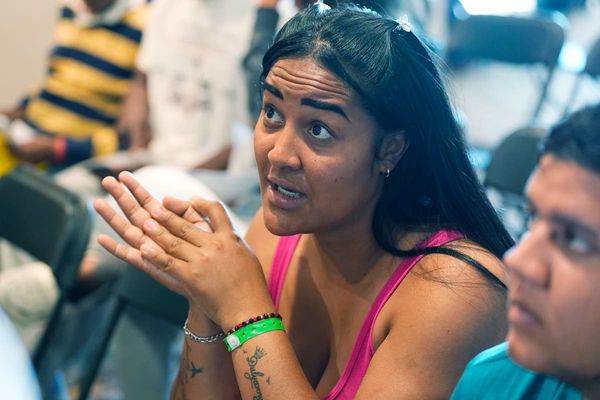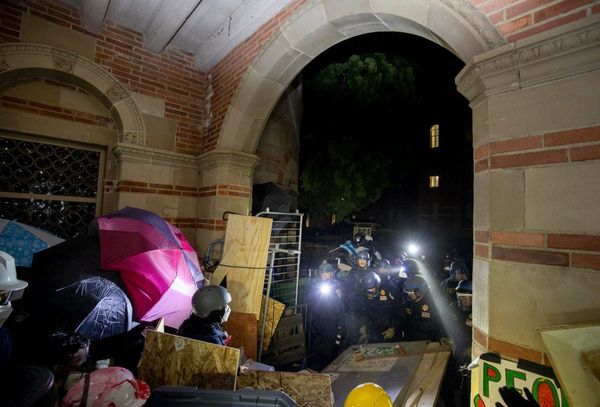
MEDELLÍN, Colombia—In a concrete house on the side of a mountain in Medellín, María Aurora del Consuelo Flores Torres, 53, stitches the hem of a tiny girl’s aquamarine dress as a group of women coo over her lacy gloves and star-adorned veil. Just outside, dogs bark, young men shout aggressively, and obscene music blasts on the radio, but it feels far away from the safe space Flores has created in her home in Comuna 2, the violent neighborhood where she has lived and worked as a tailor for nearly 40 years.
Flores was only a baby when her father was killed in the fighting that has plagued Colombia for decades. She suffered violence at the hands of her family in Medellín and ran away to live on the street, where she was repeatedly assaulted and raped. Flores eventually married, but the abuse continued after her husband developed a drug addiction. “Violence is not a joke. My youngest daughter … was the product of a rape by my husband,” Flores said. One night, Flores’ husband was murdered, leaving her a widow with four young children. She had to learn how to support and protect herself, and soon she began immersing herself in local politics and grassroots activism. Her goal: to end violence against women.
This is how Flores became a volunteer and member of Estamos Listas, or “We’re Ready” in English, the first women’s political movement to run for city council in Medellín. Estamos Listas began as a social movement in 2016, after Colombia voted against a proposed peace referendum to end half a century of civil war. Decades of bloody violence in Colombia have forced women and girls to endure systematic murder, displacement, harassment, and rape. The burden of the conflict has fallen heavily on women: according to U.N. data, Colombia has the 10th highest femicide rate in the world. Estamos Listas’ platform aims to change this by addressing issues of violence, femicide, poverty, and other hardships facing women in Colombia.
In the Oct. 27 elections, Estamos Listas succeeded in sending one candidate, Dora Saldarriaga, to the Medellín city council. Two other women also won seats in the nearby town of Santa Elena. It was a significant and symbolic win for a burgeoning political movement centered around a feminist agenda, especially in a city Estamos Listas says is known for its conservatism and institutional patriarchy.
“I see it as the first social experiment to open space for political participation to the women’s movement in all its diversity,” said Juan Carlos Arenas, from the Institute of Political Studies at the University of Antioquia in Medellín. “It will be the occasion to show in practice how the feminist agenda can be discussed … in a complex city like Medellín, whose problems demand more creative answers than we have had so far.”
The movement began with a group of five women who were fed up with being treated as second-class citizens in the city’s political hierarchy.
“They were tired of politics with men who always had them as decoration pieces, or as a quota to be met,” explained Jenny Giraldo, Estamos Listas’ communications coordinator. “They were never really allowed to be protagonists in politics in traditional parties [or], as progressive as they were, even in left-wing parties.”
Around 60 women first gathered in what has become Estamos Listas’ headquarters in an old Spanish-style home, cheerfully painted yellow and draped in pink and purple banners, in the center of downtown Medellín. They decided to recruit in an unconventional way and created circles of trust where each woman took responsibility for recruiting five other women to join the cause. The new women then brought in five more women, and thus, the movement grew. Recruiting women to the circles of trust “is a very demanding job, but that can partially explain the electoral success they have had in their first participation in elections,” Arenas said.
The women decided to build their list of candidates by consensus through an online vote. They created a platform where members of the movement uploaded a photograph, a resume, and a video, all made by the same content creator to ensure the process was equitable and no woman lost out of votes because her iPhone video was poorly lit or shaky.
Dora Saldarriaga emerged as the No. 1 candidate on the list. Saldarriaga, a short-haired, energetic lawyer and professor, recalled when she was a university student and was harassed by one of her professors, who tried to kiss her after class. At the time, she kept silent.
“Later, when I was working at the university, I went to an event of prosecutors, and I saw him and I pointed at him. The guy remembered me and left,” Saldarriaga said. “I couldn’t do it then, but I can name him now. At that time I wasn’t a feminist, and I didn’t know anything about it. But the objective responsibility I believe we have as women is to be able to speak about that kind of discrimination.”
Estamos Listas did include six men at the end of its list in order to meet Colombia’s law of quotas, which mandates that at least 30 percent of public offices are held by women. It feared that without men on the list, it would be accused of reverse discrimination and invalidated from participating in the elections.
“The main difference [between Estamos Listas and traditional political parties] is that it is a women’s-led movement with a well-founded feminist agenda. In accordance with this, the participation of women was given priority in the formation of the list and a male gender quota was included,” Arenas, the political scientist, said.
The process for selecting the men was different—women from inside the party put forth names of men they believed would be supportive of the movement’s goals, and decisions were made by the key members of the party.
“They’re our allies. We love them,” Giraldo said. “We tried to pick the best men that list could have, but they can’t be the protagonists of this story.”
But for some male residents of Medellín, a women-first movement, even with men involved, represents a threat to the status quo.
“Women, when they try to be feminists, they end up being more sexist than men themselves,” said one city resident, Sergio Berrío. His friend Andrés Meneses, seated next to him, agreed. “At some point it turns discriminatory.”
In April, after presenting its list of candidates to the registry, Estamos Listas officially became a political movement by gathering signatures from supporters and presenting them to the electoral registry. It needed just over 15,000 signatures to be considered. It presented around 41,000.
In Colombia, there’s a big difference between political movements like Estamos Listas and legally registered political parties with backing and financing. Estamos Listas deliberately chose not to be a part of the larger political machine, saying that women who choose to do so often get deprioritized by their own parties. Rather than placing candidates in established political parties, they created, and funded, their own movement, a feat experts say is challenging for women in Colombia.
“It’s much easier, in Colombia, to run campaigns or raise money if you are a man,” said Vanda Felbab-Brown, a senior fellow at the Brookings Institution think tank. “Men tend to be owners of land far more than women. They tend to be owners of enterprises far more than women. They often have a history of much greater inheritance than women. Getting a credit, access to banks for campaigns, and otherwise might be much easier for men.”
The funding mechanisms that the group used set it apart from traditional Colombian political organizations. Estamos Listas does accept donations, but it has a cap on the amount of money an individual can contribute to avoid being subject to the whims and special interests of donors. It has also established a microcredit scheme in which it borrows small sums of money from interested donors. Some individuals require repayment within a short window, so Estamos Listas uses the money and quickly secures another donation to be able to repay the money in the agreed-upon timeframe. Other donors agree to only get paid back if Estamos Listas wins seats in the council and, with it, funding to repay its loans.
“It’s a circular model of economy. The money is moving all the time,” Giraldo said. “We figure it out as we go along, like women often do.”
In true grassroots fashion, Estamos Listas sent volunteers door to door in neighborhoods across Medellín and held information sessions outside of busy public transport stops to spread their message to potential voters on their way home from work. They also harnessed the power of social media, holding Twitter-a-thons late into the night, toasting with cold bottles of Colombian beer as their hashtags trended higher and higher.
One of the most unusual aspects of the movement is how it cuts across political lines to promote a women-first agenda. Estamos Listas has a list of seven tenets that all of the movement’s members have agreed to uphold and promote.
“It’s really interesting to see how women from different political parties with very different views come together toward seven main tenets on which they all agree,” said Camila Hernandez, a program assistant for Colombia at the Atlantic Council, a Washington-based think tank. “They’re not necessarily a political movement from the right or the left. … It’s important because it’s a group of women working toward a common goal in politics, and I think it breaks with the stereotype that women cannot work together or that women are not prepared to hold significant political decisions.”
Before the Oct. 27 elections, five women already held seats on Medellín’s city council. The movement wanted to add another seven women to the council so that a total of 12 seats, or more than half the council, were occupied by women. For Giraldo, it did not matter whether the women were from the right or the left of the political spectrum, as long as there were more women’s faces represented on the city council.
But the movement fell far short of that goal. In fact, in the city council race in Medellín, two women left and two new women joined, keeping the total number at five women on a council of 21 representatives. A report by the Sisma Mujer organization shows that fewer women were elected to governorships and mayoralties in 2019 than in the last elections in 2015. And only 121 women were elected out of 1,101 total candidates, representing a mere 11 percent of the population.
“It is important to say that there has not been an increase in the political representation of women in Colombia. More women presented themselves [as candidates] but did not reach office,” said Patricia Uribe, the director of the Corporation for Life Women Who Create, a feminist organization based in Medellín. Uribe believes that Colombia’s law of quotas is too insipid to inspire meaningful political involvement on the part of women. “Real conditions are required from the political parties for the fulfillment of the affirmative actions,” she added, suggesting a 50 percent quota at minimum to ensure equal gender representation.
Experts say a culture of machismo in Colombia, combined with lack of faith in the voting system, contributes to the difficulty of women getting elected to office.
“Latin America in general tends to be a very socially conservative society. A very macho society. And that mindset has seeped into the psyche of not just men, but many women,” Felbab-Brown, of Brookings, said. “You also have the difficulty of persuading voters that if they cast a vote for you, they will not have wasted their vote.”
But the numbers did not deter Estamos Listas and the women of Medellín from viewing this as a significant and symbolic victory.
“The fact that Estamos Listas got to city council is very important news, because it’s the first time a women’s political movement is making history,” Saldarriaga wrote in a Facebook message to supporters after her win. “We’re going to be able to do politics with a gender focus. We’re going to make all these issues the city has ignored part of the public agenda. … We’re going to introduce female power.”
Estamos Listas was inspired, in part, by the historical wins made by women in the 2018 U.S. midterm elections. They see both their political movement and that in the United States as fighting back against misogynistic politics by becoming a part of the system to change it. Rep. Alexandria Ocasio-Cortez, in particular, motivated them to believe they could win, even without the backing, funding, and prior experience of other political parties.
“Female energy is something that belongs to this century,” Saldarriaga said. “I believe everything is connected, and that, when a woman like [Ocasio-Cortez] makes it to power … without prior experience, but with everything she achieved, it’s inspiring in that in other places women can get to power like that too.”







